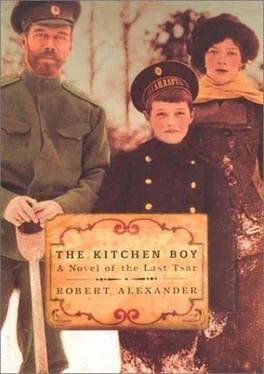Upon seeing the Heir, both women stopped still, crossed themselves, and the sister, her head bowed, said, “ Dobroye ootre , Aleksei Nikolaevich.” Good morning.
Until recently, Aleksei had always been greeted so reverently, and he thought nothing of it. With a great deal of enthusiasm and curiosity, he looked upon them and nodded to the basket.
“I see you’ve brought me more eggs.”
Sister Antonina, her eyes fixed firmly on the ground before her young master, gave a polite, “ Da-s .”
“And milk? Did you bring-”
I heard not a sound from behind, for his worn, brown boots moved with great stealth. Before I knew it, Nikolai Aleksandrovich stepped in, scooted me aside, and took hold of the wheeling chaise. In a single, gentle movement, the Tsar spun it and the Heir around.
“We must not interrupt their work, Alyosha,” said father to son.
“But-”
“We’ll let Leonka deal with the food. After all, he is the cook’s assistant. Now, how about a game of dominoes?”
Only after the Tsar and Tsarevich disappeared into the dining room and beyond did Sister Antonina and the Novice Marina raise their eyes and heads. Looking upon me with a proud, beaming smile, the sister stepped forward and kissed me peasant style, that is to say, three times on my cheeks. As she embraced me so warmly, I glanced over her shoulder, and saw that Marina was looking on, staring at me as if I were some kind of godly hero.
At the tail end of the third kiss, Sister Antonina whispered into my ear, “ Molodets .” Excellent.
The diminutive sister was musty with the unmistakable perfume of Orthodoxy, so smoky and sweet, and I pulled back, took the basket from her hand. “Here, allow me.”
And so it was that the sister and novice followed me out of the parlor, through the dining room, back around, and into the little makeshift kitchen. Cook Kharitonov stood at the counter peeling potatoes, and he eyed us over his shoulder.
“Again we have brought you the freshest of eggs,” began Sister Antonina, “as well as milk still warm from the cow. Marina herself helped with the milking.”
With that, the young girl stepped forward, handing me one glass bottle in particular and placing the other on the table. She looked at me, blushing as her eyes caught on mine.
“We will be back as soon as possible,” said Sister Antonina.
I handed the novice the bottle they’d previously brought, now empty, of course, and escorted them through the dining room and into the parlor. Sister Antonina rapped once on the doors, one of which was opened, and the two women disappeared.
While Kharitonov, potato in hand, kept a seemingly loose eye on the door for a guard, I pulled the stopper from the very bottle Marina had placed in my hands. And that was where the second note from the officer was found, the note that to this day lies with the others in the arkhivy of the Russian Federation in Moscow. Later that summer, in an attempt to hide their crimes, the Bolsheviki frantically took all such documents – diaries, photo albums, letters, as well as the secret rescue notes – upon their evacuation of Yekaterinburg.
But back then, on the twenty-fifth, the morning thereof, hope seemed to be burning bright yet again. All of the Romanovs likewise supposed that there was a note in that milk bottle, and they were eager to know its contents. Within moments of the departure of the sister and her novice, the Tsaritsa’s maid was at the door of the kitchen.
“Would you be so kind,” said Demidova, “as to fulfill Aleksandra Fyodorovna’s request for a glass of water?”
“Certainly,” replied cook Kharitonov.
Of course, I was the one to fulfill the so-called request, because such trivial tasks always fell upon me, little Leonka. And so, clutching the folded note in my hand, I went to the crock of water that we always kept on the wooden counter. I gently pulled off the cloth covering the top and ladled a glass. And then turning to Demidova, I handed her the water. As I did so I slipped the note from my palm into hers. She smiled, her head bobbed in appreciation, and she quickly stuffed the note up the long sleeve of her dress. Immediately she turned to go, but just as quickly Kharitonov spoke out.
“Would you be so kind as to tell the others,” said the cook, gazing deep into Demidova’s eyes, “that only soup and vermicelli will be served at lunch? There will be no meat until dinner – the komendant himself told me that Leonka will not be allowed to go to the Soviet for more cutlets until three.”
“I see.”
Actually what she said was “ yasno ,” which has a very rich meaning in Russian because, of course, Russian is a much richer, not to mention more beautiful, tongue than English, which is so hard-sounding and so rigid in its complex rules. Yasno doesn’t simply mean “I see,” nor does it simply mean, “It’s clear,” or “I understand.” Nyet, nyet , that single word says something infinitely more profound. What it implies is that one understands not simply the meaning of the word, but also what lies beneath the surface yet cannot be spoken. It lays out, the true, complex dynamics of a situation. In other words, Demidova understood not the day’s menu – for that was not the message at all – but that she needed to convey to the Tsar and Tsaritsa that if they wanted to reply to this note, they needed to have that reply finished by three so I could take it when I went out for meat.
So the note was delivered to the Tsar and his anxious Empress. At the time I was not privy to its contents, nor to the discussions within the family thereof. I don’t know what Nikolai and Aleksandra talked of. Oh sure, I glimpsed the words of the note when I took it out of the bottle stopper, but this one was in French too. I could not make out a word. Translated, however, the June 25, 1918, note sent to the Romanovs reads thus:
With the help of God and your sangfroid, we hope to succeed without taking any risk. One of your windows must be unglued so that you can open it at the right time. Indicate which window, please.
The fact that the little Tsarevich cannot walk complicates matters, but we have taken that into account, and I don’t think it will be too great an inconvenience. Write if you need two people to carry him in their arms or if one of you can take care of that. If you know the exact time in advance, is it possible to make sure the little one will be asleep for one or two hours before the escape?
The doctor must give his opinion, but in case of need we can provide something for that.
Do not worry: no attempt will be made without being absolutely sure of the result.
Before God, before history, and before our conscience, we give you this solemn promise.
An Officer
Although at that time I didn’t know what was said specifically in the second letter, it soon became apparent that our rescuers were progressing with their plan and circling ever closer toward our salvation. Sure, I perceived this because the entire Imperial Family took on an air of near gaiety, a lighter tone such that was otherwise seen only when the Heir was in good health and spirits. And just as I was not witness to the Tsar reading the note, nor was I witness to him replying to it. I assumed then, as I still do to this day, that they commenced a reply almost at once, because for the rest of the morning, while I busied myself helping Kharitonov, all the Romanovs were busy with their books and their diaries and their letters. Da, da , they wrote a good many letters from their captivity to Nikolai’s mama, the dowager or as she was referred to, the older empress, who was under house arrest in the Crimea, as well as letters to Aleksandra’s sister, Grand Duchess Ella, the nun, who was under arrest not far away in Alapayevsk, and to their friends like Anna Vyrubova and the such. That was how things appeared for the rest of the morning, business as usual. They went to great lengths to make it appear so. Several of the children even studied too, including Olga Nikolaevna, who at one point took her writing tablet, a French novel, and her French-Russian dictionary to her father for his assistance.
Читать дальше












